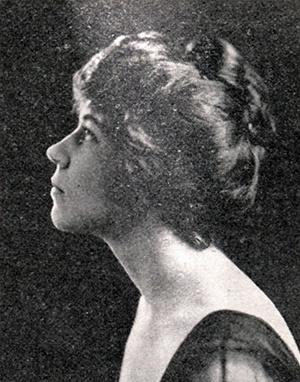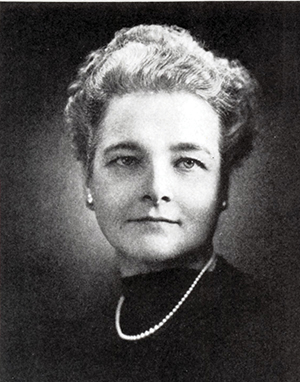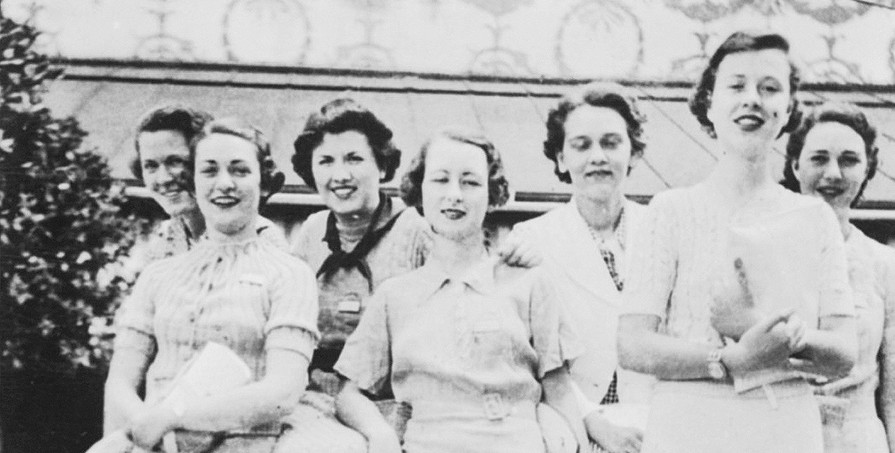“Our sole purpose is to promote the development of the individual that the individual member may succeed in making a satisfactory adjustment to life and take her place as a leader in her community.”
–From the Report of the President of Delta Delta Delta for 1938-1940
From its earliest days, Tri Delta has encouraged its members to follow their professional dreams and offered guidance and encouragement to assist them in achieving those dreams—even when women were not widely accepted in the workforce.
Founder Eleanor Dorcas Pond provided one of the first articles published in The Trident on careers for women. Her article, “The Woman Doctor,” appeared in the 1896 issue, and in it, Eleanor shared both her struggles to be accepted in the field and her tremendous satisfaction working with her patients
“Your Work and Ours”
By 1914, the Education Department of the Fraternity started reviewing different professions in The Trident, looking at careers such as library sciences, social work, law, nursing and even movie theater ownership. In 1917, an Advisory Vocational Committee was created along with an Employment Bureau headed by Edith Say, Wesleyan/Connecticut, marking the first steps in helping members find meaningful careers. When the outbreak of World War I created a demand for trained nurses and government workers, articles appeared in 1918 issues of The Trident promoting training and job opportunities for members.
After the war, career prospects began to change for women, in part because so many had successfully filled critical positions during the conflict. The Trident again played an important supporting role by highlighting non-traditional careers for members, beginning in 1919 with the column “Your Work and Ours,” where alumnae shared experiences regarding their professions. The column’s success led to additional columns and features on vocational choices, particularly those unusual for women at the time.
“Opportunities for Women”

In the fall of 1920, Marjorie Wilson, St. Lawrence, a vocational advisor with special training and experience, was appointed by the National Council to visit collegiate chapters across the country to provide personalized counseling to our members. Tri Delta was the first organization with such a program, impressing many college authorities who wanted to create similar programs for their schools.
Marjorie’s Fall 1920 Trident article, “Opportunities for Women,” provided an interesting look at women’s progress in various professions. She wrote that medicine and law were becoming more open to accepting women, as were banking and finance, thanks to their success during the war. While some had managed careers in advertising, editing and journalism, Marjorie cautioned that many had to start with low-paying jobs and work their way up. She encouraged collegians with interests in science to look for openings noting that women chemists were in demand.
“I Want To Be…”

At the 1936 Convention, collegians could attend vocational roundtables conducted by alumnae who were leaders in their fields. Hortense Hudson, Baker, a past Fraternity president and head of a personnel counseling firm in New York City, arranged the conferences. As a result of the interest generated by the program, “I Want to Be …” was introduced as a new department of The Trident in March 1937.
Its first installment looked at careers in music and landscape architecture written by Tri Deltas working in those fields. The series provided a frank look at both the positive and negative sides of each career, sometimes giving members the less glamorous aspects of dream occupations. The popular series ran for nearly 20 years and featured a wide array of vocational choices, including medical technologist, recreation director, radio operator, health educator, photographer, dentist and copywriter.
Tri Delta was seen as a leader among Greek organizations for our efforts in providing career development. In a speech at Tri Delta’s 1938 Convention, Ernestine Block Grigsby, Colorado, said:
“You who follow The Trident, and who attended the last Convention, know that we have been working toward a vocational educational program and probably anticipated a further development. Again it has been interesting to watch our fellow Greeks follow our lead and insert ‘departments of vocational information’ in their magazines. One men’s fraternity editor said that we had led the field by presenting this and that he has been interested in watching our progress. He complimented the fraternity on such a forward-looking progress of service. I believe eventually such a plan of service could be self-supporting, and should be, with a possible subsidy at the beginning.”
Ernestine Block Grigsby, Colorado
As increasing numbers of members began asking for more practical vocational assistance, Tri Delta’s Executive Board commissioned a study into what kind of assistance to provide. As a result, Tri Delta continued its vocational counseling program and began working with local alumnae to create a local service for collegians and alumnae. Hortense visited alumnae across the country to set up the program, which varied based on the resources available in each city.
Empowering Tri Deltas Today
Although the program Hortense envisioned never happened, The Trident continued “I Want to Be …” until 1954. In 1955, Leadership School—now known as Collegiate Leadership Conference—began providing members with training essential for chapter operations and leadership skills valuable in the workplace. In the 1960s, The Trident continued to explore new fields and employment options. As more members joined the workplace in the 1970s, advice on successful job searches appeared in The Trident and through training sessions and workshops.
In the early 1980s, career guidance interest was renewed with the introduction of networking to help establish professional relationships or business contacts among members. Tri Delta created several increasingly sophisticated platforms for networking throughout the decades—the most recent being our first networking app, CONNECTDDD, launched in 2019.
Today, Tri Delta continues to support our members’ growth and development through programs like Life After College, which teaches collegiate members how to translate their Tri Delta experience into transferrable skills as they begin their careers. Mostly recently, Tri Delta announced its newest offering for members: the miniMBA in collaboration with Miami University’s Farmer School of Business.
Additionally, all Tri Deltas can take part in leadership programming through LEADDD keynotes, workshops and conferences and on LEADDDer.org, our on-demand, self-paced platform. Tri Delta’s transformational programs are made possible through the generous support of donors to Tri Delta’s Foundation, including the Mildred Bland Miller Charitable Fund.
Tri Delta alumnae from a wide array of fields continue to be featured in The Trident and on our Let’s Talk Tri Delta podcast, where they share guidance and expertise much as Eleanor did for Tri Delta physicians in 1896. Today’s Tri Delta members continue to blaze new career paths and Tri Delta continues to offer support, programs and resources to sisters as they pursue lifelong opportunities for growth.

